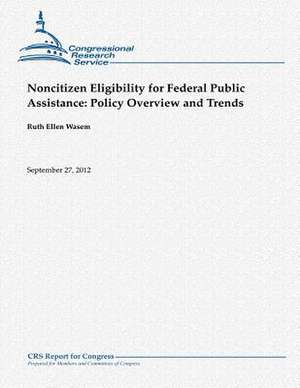Noncitizen Eligibility for Federal Public Assistance
Autor Ruth Ellen Wasemen Limba Engleză Paperback
Preț: 99.36 lei
Nou
Puncte Express: 149
Preț estimativ în valută:
19.01€ • 19.89$ • 15.79£
19.01€ • 19.89$ • 15.79£
Carte disponibilă
Livrare economică 13-27 martie
Preluare comenzi: 021 569.72.76
Specificații
ISBN-13: 9781480152656
ISBN-10: 148015265X
Pagini: 32
Dimensiuni: 216 x 279 x 2 mm
Greutate: 0.1 kg
Editura: CREATESPACE
ISBN-10: 148015265X
Pagini: 32
Dimensiuni: 216 x 279 x 2 mm
Greutate: 0.1 kg
Editura: CREATESPACE
